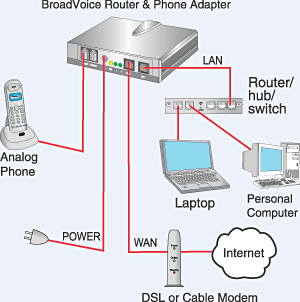Voice over IP


Voice over Internet Protocol (VoIP), also known as IP telephony, is a methodology and group of technologies for the delivery of voice communications and multimedia sessions over Internet Protocol (IP) networks, such as the Internet. The terms Internet telephony, broadband telephony, and broadband phone service specifically refer to the provisioning of communications services (voice, fax, SMS, voice-messaging) over the public Internet, rather than via the public switched telephone network (PSTN), also known as plain old telephone service (POTS).
Overview[edit]
VoIP works by converting voice signals into digital data packets and transmitting them over the internet or any other IP-based network. It can be used on various devices, including traditional telephones with adapters, dedicated VoIP phones, computer software, and mobile applications. The technology encompasses a range of protocols and components, such as Session Initiation Protocol (SIP), which is used to initiate, maintain, and terminate real-time sessions.
History[edit]
The development of VoIP technology began in the early 1990s. The first successful VoIP call was made in 1995, which marked the beginning of the shift towards the convergence of voice and data networks. Since then, VoIP has evolved significantly, with improvements in quality, reliability, and security, making it a viable alternative to traditional telephone services.
Advantages[edit]
VoIP offers several advantages over traditional telephony, including lower costs, greater flexibility, and the ability to integrate with a wide range of services. For businesses, VoIP solutions can provide advanced call handling features, such as call forwarding, voicemail to email transcription, and conference calling. For consumers, VoIP services often offer free or low-cost calls, both domestically and internationally.
Challenges[edit]
Despite its benefits, VoIP faces challenges, including dependency on internet connectivity, power outages, and potential security vulnerabilities. Quality of Service (QoS) can also be an issue, as VoIP traffic competes with other data on the network, potentially leading to delays or degraded call quality.
Regulation[edit]
The regulation of VoIP services varies by country. Some jurisdictions treat VoIP providers like traditional telecom operators, requiring them to offer emergency call services, comply with wiretapping regulations, and contribute to the universal service fund. Others have adopted a more hands-off approach, allowing the market to dictate the evolution of VoIP technologies.
Future Directions[edit]
The future of VoIP is likely to see further integration with cloud services, artificial intelligence, and the Internet of Things (IoT), offering more innovative and efficient ways to communicate. The ongoing deployment of 5G networks is also expected to significantly improve VoIP quality and reliability by providing higher bandwidth and lower latency.
Ad. Transform your life with W8MD's Budget GLP-1 injections from $49.99


W8MD offers a medical weight loss program to lose weight in Philadelphia. Our physician-supervised medical weight loss provides:
- Weight loss injections in NYC (generic and brand names):
- Zepbound / Mounjaro, Wegovy / Ozempic, Saxenda
- Most insurances accepted or discounted self-pay rates. We will obtain insurance prior authorizations if needed.
- Generic GLP1 weight loss injections from $49.99 for the starting dose of Semaglutide and $65.00 for Tirzepatide.
- Also offer prescription weight loss medications including Phentermine, Qsymia, Diethylpropion, Contrave etc.
NYC weight loss doctor appointmentsNYC weight loss doctor appointments
Start your NYC weight loss journey today at our NYC medical weight loss and Philadelphia medical weight loss clinics.
- Call 718-946-5500 to lose weight in NYC or for medical weight loss in Philadelphia 215-676-2334.
- Tags:NYC medical weight loss, Philadelphia lose weight Zepbound NYC, Budget GLP1 weight loss injections, Wegovy Philadelphia, Wegovy NYC, Philadelphia medical weight loss, Brookly weight loss and Wegovy NYC
|
WikiMD's Wellness Encyclopedia |
| Let Food Be Thy Medicine Medicine Thy Food - Hippocrates |
Medical Disclaimer: WikiMD is not a substitute for professional medical advice. The information on WikiMD is provided as an information resource only, may be incorrect, outdated or misleading, and is not to be used or relied on for any diagnostic or treatment purposes. Please consult your health care provider before making any healthcare decisions or for guidance about a specific medical condition. WikiMD expressly disclaims responsibility, and shall have no liability, for any damages, loss, injury, or liability whatsoever suffered as a result of your reliance on the information contained in this site. By visiting this site you agree to the foregoing terms and conditions, which may from time to time be changed or supplemented by WikiMD. If you do not agree to the foregoing terms and conditions, you should not enter or use this site. See full disclaimer.
Credits:Most images are courtesy of Wikimedia commons, and templates, categories Wikipedia, licensed under CC BY SA or similar.
Translate this page: - East Asian
中文,
日本,
한국어,
South Asian
हिन्दी,
தமிழ்,
తెలుగు,
Urdu,
ಕನ್ನಡ,
Southeast Asian
Indonesian,
Vietnamese,
Thai,
မြန်မာဘာသာ,
বাংলা
European
español,
Deutsch,
français,
Greek,
português do Brasil,
polski,
română,
русский,
Nederlands,
norsk,
svenska,
suomi,
Italian
Middle Eastern & African
عربى,
Turkish,
Persian,
Hebrew,
Afrikaans,
isiZulu,
Kiswahili,
Other
Bulgarian,
Hungarian,
Czech,
Swedish,
മലയാളം,
मराठी,
ਪੰਜਾਬੀ,
ગુજરાતી,
Portuguese,
Ukrainian
